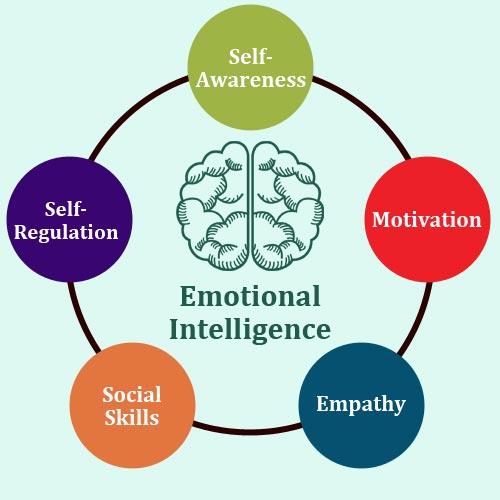Hey QT, what’s your IQ & EQ?
Posted on: November 28, 2017
Remember when IQ was the only form of measuring your intelligence? A high IQ can get you only so far in this world. For example, high IQ can land you a high paying career, but to be successful in that job, you have to have a high Emotional Intelligence (EQ). Studies have found that, “people with average IQs outperform those with the highest IQs 70 percent of the time.” Why is that? Well it’s because they perform higher in their EQ. What’s Emotional Quotient?! “Emotional intelligence affects how we manage behavior, navigate social complexities and make personal decisions that achieve positive results.” Travis Bradberry, the author of Emotional Intelligence 2.0. The basic 4 Pillars of EQ are up to us, it’s our choice. Our choice to understand, have self control, have empathy, and have conflict resolution. Easier said than done, but understanding the 4 pillars of our EQ is key. 1. Self Awareness 2. Self-Management 3. Social Awareness 4. Relationship Management Your Emotional intelligence level impacts not only your personal well-being, but also contributes to your success and ability to connect with others. The stronger your EQ, the more consciously interactive and less reactive you are. The psychologist who popularized the term emotional intelligence, Danial Goleman believes, “Emotional Intelligence abilities — rather than IQ or technical skills — emerge as the ‘discriminating’ competency that best predicts who among a group of very smart people will lead most ably.” You may be smart, but that may not be enough in today’s job market. More companies are also looking for those who are emotionally savvy. According to Goleman’s Emotional Competence Framework, we humans have 25 emotional competencies spread across 5 general dimensions of emotional intelligence — Self-Awareness, Self-Regulation, Motivation, Empathy, and Social Skills. Curious where your EQ strengths and areas of improvement lay? You can take action now to gain personal insight into your EQ. See below… Since Emotional Quotient or EQ, is a skill, and a skill that anyone can learn, what if we practiced this skill? We can improve our Personal Competencies (Self-Awareness, Self-Regulation, and Motivation) and Social Competencies (Empathy and Social Skills) to greatly improve our lives. Are we as a society overvaluing our IQ? What if our focus was on the quotient variable we have control over? To demonstrate that it can greatly improve our lives, top current recruiters state that success in the workforce in relation to the importance of EQ, cannot be understated. Experts state that this is especially the case for “knowledge workers, millennials and members of the creative class, who simply don’t respond to old-school methods of motivation in the workplace.” What’s even more interesting, Trevor Blair from Manpower recruiting company said some business types continue to think of EQ as some “fluffy, new-agey mumbo that has no place in a fast-paced company,” the smart companies are realizing the true value of EQ. Blair reports, “The fact is, no leader can reach their potential without it.” “In order to understand other people and what motivates them to perform at their best, you first have to understand yourself.” Enhancing EQ, not only enhances leadership potential, it can also translate into real dollars, according to Bradberry. “People with a high degree of emotional intelligence make more money — an average of $29,000 more per year than people with a low degree of emotional intelligence,” he writes. “The link between emotional intelligence and earnings is so direct that every point increase in emotional intelligence adds $1,300 to an annual salary.” The good news is that unlike IQ — which is considered to be static and unchangeable no matter how much you study or work to improve it — emotional intelligence can be boosted and grealty improved. These three words are guaranteed to impact your emotional intelligence, ‘It’s my choice’. Saying this to yourself throughout the day reminds you, you can determine your EQ in owning that it’s your choice to behave a certain way. It’s your choice to think the way you think, feel the way you feel and act the way you act. For example, it all boils down to it’s your choice; to forgive or to be angry, do something or do nothing, and to have compassion, or not. Every decision you make is going to determine how emotionally intelligent you are. Interested in finding out what your EQ is and how to develop it? Consider these 3 resources; A. UC San Diego Extension through its Center for Life/Work Strategies offers what is known as an “EQ-1 2.0” assessment. After the assessment, a person meets with a licensed career coach to review the results and provide recommendations. B. In addition, the Center for Life/Work Strategies also offers a three-hour workshop on the importance of EQ twice a year. C. Email Learn Pure Wellness company as we are happy to give you a free EQ assessment; learnpure@gmail.com

 Facebook
Facebook Instagram
Instagram Pinterest
Pinterest Twitter
Twitter Google+
Google+
